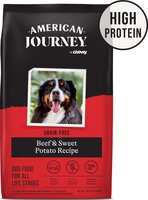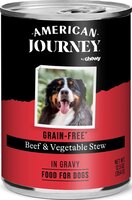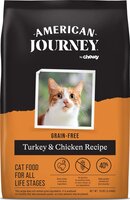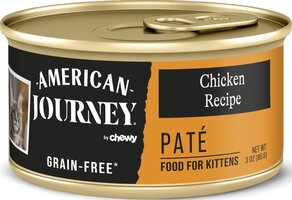
Blue Buffalo vs. American Journey
In this comparison article for Blue Buffalo vs American Journey, we'll highlight the key differences between these two pet food brands. To properly compare Blue Buffalo and American Journey, we'll use up-to-date nutritional and price information.
There are many factors to consider when choosing the best pet food brand for your pet. Factors such as ingredient quality, guaranteed analysis, product safety, brand history, and cost are among the most important factors to consider.
Throughout this American Journey vs Blue Buffalo comparison, we've utilized average data to make general comparisons. If you'd like to see individual product reviews, visit our Blue Buffalo Review Page or American Journey Review Page.
Guaranteed Analysis: American Journey vs. Blue Buffalo
According to AAFCO, all pet food labels must provide a guaranteed analysis of nutrient content. The analysis must provide guaranteed minimum percentages of crude protein and crude fat, and maximum percentages of crude fiber and moisture.
All percentages used in this comparison are averages reported on a dry matter basis.
Blue Buffalo Dog Food vs. American Journey Dog Food
| Dry Dog Food | Blue Buffalo | American Journey |
| Crude Protein | 29.5% | 31.8% |
| Crude Fat | 15.3% | 14.7% |
| Crude Fiber | 6.8% | 6.4% |
| Wet/Canned Dog Food | Blue Buffalo | American Journey |
| Crude Protein | 40.0% | 40.7% |
| Crude Fat | 26.2% | 27.6% |
| Crude Fiber | 7.4% | 7.0% |
Crude Protein Comparison For Dog Food
Dogs require twenty-two amino acids to sustain life. Twelve of these amino acids are synthesized naturally, the remaining ten are consumed. Protein is the nutrient which provides some or all of these ten essential amino acids.
There is a small difference between the protein content of American Journey and Blue Buffalo. We can see that American Journey guarantees about 2.28% more protein than Blue Buffalo. For wet dog foods, American Journey and Blue Buffalo provide roughly the same amount of protein.
Crude Fat Comparison For Dog Food
Fats are an absolutely vital component of a balanced canine diet. Not only do fats provide energy, but they also serve important roles in the normal development and function of your dog's body. For example, fats help dogs produce prostaglandins, which reduce inflammation among many other significant functions.
There is a relatively insignificant difference between the crude fat content of the two brands. With regards to wet dog food, American Journey and Blue Buffalo also provide roughly the same amount of crude fat.
Both brands provide roughly the same amount of crude fiber. With regards to wet dog food, Blue Buffalo and American Journey also provide roughly the same amount of crude fiber.
Blue Buffalo Cat Food vs. American Journey Cat Food
| Dry Cat Food | Blue Buffalo | American Journey |
| Crude Protein | 37.5% | 39.8% |
| Crude Fat | 16.8% | 16.2% |
| Crude Fiber | 6.2% | 5.5% |
| Wet/Canned Cat Food | Blue Buffalo | American Journey |
| Crude Protein | 45.8% | 52.9% |
| Crude Fat | 24.3% | 20.8% |
| Crude Fiber | 8.1% | 5.8% |
Crude Protein Comparison For Cat Food
Cats require twenty-two amino acids to sustain life. Eleven of these amino acids are synthesized naturally, the remaining eleven are consumed. Protein is the nutrient which provides some or all of these eleven essential amino acids.
According to our average data, Blue Buffalo typically provides less protein than American Journey. However, this difference is relatively small and doesn't represent a significant difference between the two brands. In addition, American Journey wet cat foods also provide more protein than Blue Buffalo wet foods.
Crude Fat Comparison For Cat Food
There are many ways in which dietary fat contributes to the overall health of our feline friends. Here is a short list of benefits provided by fats (not exhaustive):
- Fats help with the digestion and absorption of fat-soluble vitamins
- Reduce inflammation associated with arthritis
- Slow the growth of yeast infections
- Prevent or reduce the likelihood of certain heart problems.
- Aid in the development of the retina and visual cortex.
As you can see, American Journey and Blue Buffalo guarantee a similar amount of crude fat. For wet cat foods, Blue Buffalo typically provides a little more fat (about 3.47% more).
American Journey and Blue Buffalo both provide roughly the same amount of crude fiber. For wet cat foods, Blue Buffalo typically provides a little more fiber (about 2.29% more).
Blue Buffalo Pet Food Ingredients vs. American Journey Pet Food Ingredients
Blue Buffalo and American Journey both use the following controversial ingredients in many of their products:
Here are some of the controversial ingredients used only by Blue Buffalo.
Here are some of the controversial ingredients used only by American Journey.
We believe that certain pet food ingredients are linked to adverse health affects; these ingredients are classified as harmful.
Here are some of the harmful ingredients used only by Blue Buffalo.
Here are some of the harmful ingredients used only by American Journey.
Product Safety: Recall History of Blue Buffalo & American Journey?
Blue Buffalo has been recalled 9 times.
- Nov. 25, 2015: Salmonella
- Nov. 6, 2015: Presence of Propylene Glycol
- May 31, 2016: Mold
- March 18, 2017: elevated beef throid hormone
- Feb. 14, 2017: presence of aluminum
- March 3, 2017: Foil Seal Packaging Problem
- Oct. 8, 2010: toxic levels of vitamin D
- April 19, 2007: Melamine
- April 26, 2007: Melamine
According to our records, American Journey has never been recalled.
Price Comparison: Which Brand Is More Expensive?
| Dry Dog Food | Blue Buffalo | American Journey |
| Per Pound | $3.42 | $2.16 |
| Per Calorie | $0.0021 | $0.0014 |
| Dry Cat Food | Blue Buffalo | American Journey |
| Per Pound | $5.07 | $2.96 |
| Per Calorie | $0.0031 | $0.0018 |
| Wet Dog Food | Blue Buffalo | American Journey |
| Per Pound | $5.09 | $2.83 |
| Per Calorie | $0.0100 | $0.0054 |
| Wet Cat Food | Blue Buffalo | American Journey |
| Per Pound | $7.50 | $6.24 |
| Per Calorie | $0.0153 | $0.0141 |
The average cost-per-lb is heavily influenced by the varying amounts of moisture present in each brand's food products (wet vs. dry food, dry vs. freeze-dried food, etc). However, the average cost-per-kcal eliminates the influence of moisture. Therefore, the average cost-per-kcal is the better metric to consider.
If you'd like to calculate the average cost-per-day or cost-pet-year of feeding Blue Buffalo or American Journey, input your pet's weight into our cost analyzer widget.
Averages price data can identify whether or not there exists a significant price difference between two brands. However, the actual price that you'll pay for Blue Buffalo or American Journey will depend on your shopping habits.
Pet owners who use our price comparison feature typically save more than 25% off retail prices for Blue Buffalo and American Journey. In addition, we currently have some great coupons for our readers.
- 20% Off First Auto-Ship @ PetFlow (Use Code PAWDIET20)
- 35% Off First Auto-Ship @ Chewy (No Code Required)
- 15% Off The Entire Site @ OnlyNaturalPet (Use Code AFPAWDIET)
Disclosure: PawDiet has an affiliate relationship with stores featured (or linked-to) in this article. We are compensated for referring customers. Thank you for shopping with our retail partners!
Where To Buy Blue Buffalo Pet Foods
You can purchase Blue Buffalo pet foods from the following stores:




Where To Buy American Journey Pet Foods
You can purchase American Journey pet food products from these retailers:

Type Of Pet Foods Available
| Product | Blue Buffalo | American Journey |
| Dry Dog Food | 93 Recipes | 43 Recipes |
| Wet Dog Food | 94 Recipes | 11 Recipes |
| Dog Treats | 50 Treats | 44 Treats |
| Dry Cat Food | 42 Recipes | 14 Recipes |
| Wet Cat Food | 59 Recipes | 23 Recipes |
| Cat Treats | 16 Treats | 5 Treats |
Top Rated Blue Buffalo Recipes
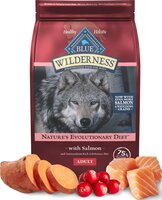
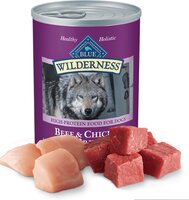
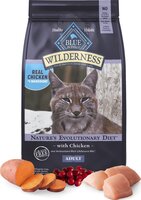
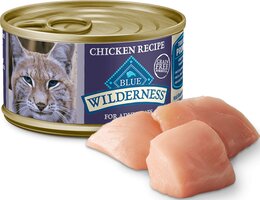
Top Rated American Journey Recipes
